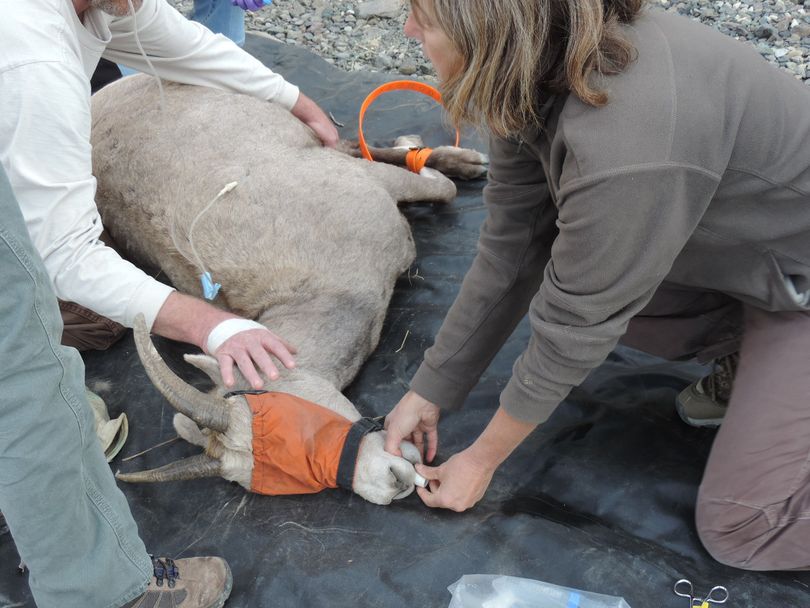Hells Canyon bighorns removed for disease study

WILDLIFE -- Washington Department of Fish and Wildlife workers used helicopter net gunners Wednesday to capture eight infected bighorn ewes along the Grande Ronde River.
The wild sheep are to be transported to a South Dakota State University facility for research on pneumonia outbreaks that have been deadly to the bighorn sheep in the Hell's Canyon area as well as in the Yakima River area and in Montana.
Here's more detail on the capture and research project from Eric Barker of the Lewiston Tribune:
Bighorn sheep near Heller Bar infected with a newly discovered strain of the deadly pneumonia bacteria that has plagued wild sheep herds for decades will be captured and taken to a South Dakota research facility this week.
The capture is designed to prevent the spread of the new strain, which is killing both adults and lambs, to other nearby herds.
The Washington Department of Fish and Wildlife and Idaho Department of Fish and Game plan to use a helicopter to capture eight ewes that are an isolated subgroup to the Black Butte Herd. They will be trucked to South Dakota State University, where scientists are studying the disease. Any sheep that can’t be captured will be euthanized, according to a news release from the Washington Department of Fish and Wildlife.
The larger Black Butte Herd was initially infected with the bacteria, which causes pneumonia, in a 1995 outbreak that was traced to contact between bighorn sheep and a domestic goat. Die-offs of bighorn sheep throughout the West have followed contact between wild sheep and domestic goats and domestic sheep.
The 1995 outbreak led to mass die-offs of wild sheep throughout the Hells Canyon region.
In general, animals that survived the initial outbreak have been able to live normal lives and reproduce. But their lambs often suffer high rates of mortality year after year.
The new strain, discovered this summer, appears to be more deadly. Rich Harris, manager of sheep, goats and moose for the Washington Department of Fish and Wildlife at Olympia, said adult sheep that have previously been exposed to the mycoplasma ovipneumoniae bacteria are dying from the new strain. Wildlife managers want to remove animals exposed to the bacteria prior to the onset of the bighorn mating period, which begins later this month. Rams travel beyond their normal home ranges while looking for mates during that rut, leaving open the possibility that a ram could mate with the ewes and then carry the new strain to other herds. Harris said the new strain has not been detected in sheep outside of the ewes living near Heller Bar.
"We believe these ewes are not only a remnant population with little chance of recovery, but a threat to other bighorn herds throughout Hells Canyon," Harris said.
The new strain was identified by researchers at Washington State University. Harris said the bacteria has no adverse effects on humans and there is little risk to other animals.
Wildlife managers don’t know where the new strain came from or if there has been new contact between wild sheep and domestic sheep or goats.
